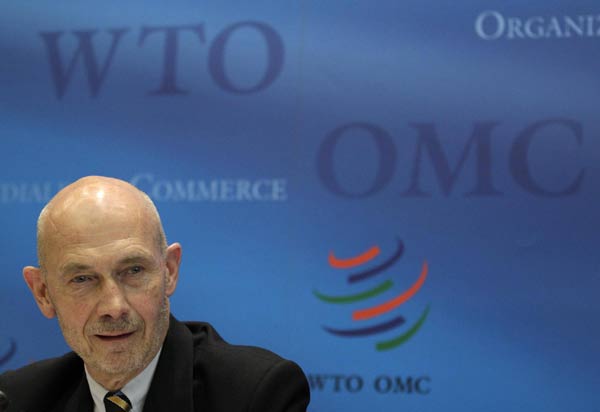
 |
|
World Trade Organization Director General Pascal Lamy addresses a news conference on annual trade forecast and statistics at the WTO headquarters in Geneva April 12, 2012. [Photo/Agencies]
|
The WTO's projected 3.7 percent growth rate for world merchandise trade in 2012 -- with 2 percent export growth anticipated for developed economies and 5.6 percent for developing economies -- is below the long-term average of 6 percent for 1990 to 2008, and down from the average of 5.5 percent over the last 20 years including the period of the trade collapse. Economists figured out that downside risks would include deeper recession in the Eurozone and rising commodity prices.
The total dollar value of world merchandise exports increased by 19 percent to $18.2 trillion in 2011, which is a record, in spite of the fact that was driven in large part by higher primary commodity prices, according to the report. Commercial services exports also grew 11 percent in 2011 to $4.1 trillion.
A significant braking of trade expansion had been forecast for 2011, but multiple economic setbacks during the year dampened growth beyond expectations and led to a stronger than anticipated easing in the fourth quarter.
"More than three years have passed since the trade collapse of 2008-09, but the world economy and trade remain fragile. The further slowing of trade expected in 2012 shows that the downside risks remain high. We are not year out of the wood," WTO Director-General Pascal Lamy said.
Statistics showed that the rate of world output growth fell to 2.4 percent in 2011 from 3.8 percent in the previous year, weighed down by the ongoing sovereign debt crisis in Europe, supply chain disruptions from natural disasters in Japan and Thailand, and turmoil in Arab countries. This pace of expansion was well below the 3.2 percent average over the 20 years leading up to the financial crisis in 2008.
Fast growing economies in 2011 include the Middle East, Commonwealth of Independent States (CIS), South-Central America, China and four newly industrialized economies (NIEs), namely China's Hong Kong, the Republic of Korea, Singapore and Chinese Taipei.
The present trade forecast assumes global output growth of 2.1 percent in 2012 at market exchange rates, and there are severe downside risks for growth that could have even greater negative consequences for trade if they came to pass, including a steeper than expected downturn in Europe, financial contagion related to the sovereign debt crisis, rapidly rising oil prices, and geopolitical risks.
The world imports growth also dropped sharply in 2011 from the previous year, down from 13.7 percent to 4.9 percent, according to the statistics. Fastest growing imports include China and India.
"The WTO has so far deterred economic nationalism, but the sluggish pace of recovery raises concerns that a steady trickle of restrictive trade measures could gradually undermine the benefits of trade openness. WTO members should turn their attention to revitalizing the trading system and to ensuring such a scenario does not materialize," Lamy said.
The report also forcasted the world trade volume for 2013 is expected to recover to 5.6 percent, based on assumptions about the longer term trajectory of gross domestic product (GDP), with exports of developed and developing economies increase by 4.1 percent and 7.2 percent, and imports increase by 3.9 percent and 7.8 percent.